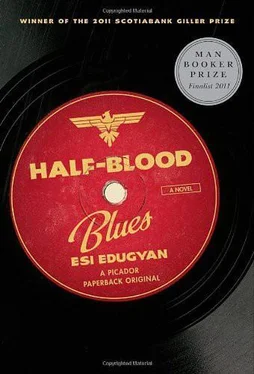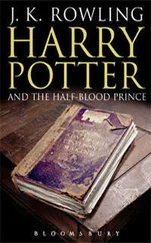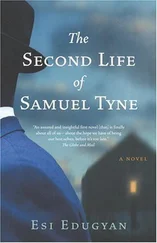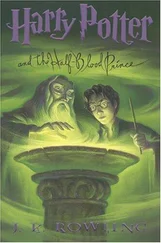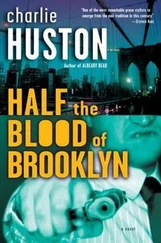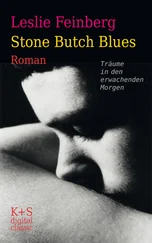‘I’m good with wheels, Mr Jones,’ she said.
He stared at her like he ain’t never seen such a creature. Then he laughed. ‘Aw, you just call me Chip.’
‘Chip, then. You must call me Buggy. Liesl is far too… comatose.’
The kid give me a brooding look as I sat down.
Liesl was still laughing. She obviously one of those janes who can’t stand pauses in conversation, will do anything to fill them. She seem so frail, so delicate. Beautiful like a turning season, like something you known just ain’t going to last. ‘Yes, it’s because of this,’ she was saying, slapping the arm of her wheelchair with a flat report. ‘If you can’t laugh at it, Chip, then it’s a sad fate indeed.’
‘Sad fate,’ the kid muttered, scowling. ‘That chair cost more than folk make in a year.’
‘On the other hand,’ I said in soft rebuke, ‘her legs don’t work.’
Hiero scowled again. ‘Ernst ain’t foolin. She seem alright, don’t she. But he know his family, Sid. That girl be dangerous.’
I glanced over at him, taken aback by the anger in his voice. He watched Liesl in her chair, watched her run her fingers through Chip’s scruffy afro. ‘I never liked Hamburg,’ he said with a soft fury. ‘My mama come through here sometimes. I reckon it reminded her of my daddy. I always hated it. My mama, she from Köln.’
I lift my face, hearing that. ‘ From Köln? You mean she born there?’
‘What else do she from Köln mean?’
‘So you a Mischling then?’
‘What. It ain’t obvious?’
‘You looked in a mirror? Ever?’
He studied the smooth back of his hands. ‘Black as a starless night.’
‘Ain’t nothin wrong with black, buck.’
‘My daddy from Cameroon.’
‘Cameroon? Hell.’
The kid smiled shyly. ‘He been royalty there. Kaiser Wilhelm II hisself invite him to this country to be schooled here, to study medicine. He sailed into Hamburg on the Wöhrmann Line in 1899. Met my mama on a school break. That was in April. She was studying to be a nurse. Then he graduate, move on down Köln, marry her.’
‘Sound like you got all the facts real accurate,’ I said. Thinking, Shit, you tell a tale like you don’t want to be believed . ‘Royalty. Shit.’
He grinned at me. ‘For real. Hard to believe, ain’t it.’
‘It hard to believe alright.’
Chip went over to the Horch, pulled old Ernst’s licorice stick out of the backseat, and brought it back to where Liesl was parked in the sunlight. He start showing her how to finger that clarinet. Then he took it from her, smile, lift it to his lips, and blown a sharp needling high C. He wiped off the reed, passed it back to her.
Hiero looked at me, lifting his eyebrows sourly. ‘You know what I think when I look at her?’
‘What.’
He studied her with his small dark eyes. ‘I’ll show you,’ he said in a flat voice. ‘We got to drive to it though.’
I run a hand over my eyes, like to shield some of that bright sunlight. I felt real tired. That heaviness in me again. ‘It ain’t safe, kid.’
‘It safe enough.’ He studied me, set a hand on my arm. His grip was strong. ‘I won’t let nothin happen. I swear.’
I looked at him in surprise.
But we sat awhile longer in the sunlight, neither of us moving. The kid watched Chip wheeling Liesl over the flagstones.
‘My middle name be Thomas,’ he said. ‘I want you to know that. I ain’t keepin it a secret.’
I sort of smiled at him, sad like. It seemed such a small thing to offer. ‘Roscoe,’ I said. ‘Sidney Roscoe Griffiths.’
Hamburg. It wasn’t nothing to me, another grim north German city. I remembered it being rainy, its skies a murky grey like a constant reflection of water. We come through here once or twice working the clubs to the damn Swing Boys. Them rich sweet-faced kids who come out to defy the Housepainter. Every last one of them got up in glen-checked suits and crepe-soled shoes, short skirts and silk stockings, their long hair so thick with grease you could roast a pig in it. Like it what you wear that matter. I known they meant well, known they was our audience, but man, most ain’t known two strokes bout jazz, come out only cause of the ban. Kids who thought Whiteman, Gluskin, Bela was the equals of a Armstrong or a Basie. Ain’t even able to cut the rug, their arms all swinging together like some hundred-legged beast. Shaking their hair or their homburgs or their closed umbrellas. I known they loved us, got beat up in the streets cause of us. And hell, I wanted to love them back. But I ain’t never did.
I thought about it as we drove on through the town. All that Swing culture was already dying.
Kid and me ain’t hardly talked on the drive. Maybe he was thinking some of the same thoughts I was. At last he tapped the dashboard with his long soft fingers, gestured for me to pull into a lot. I come to a stop, the Horch purring quietly, then stared up through the window at the big sign on the fence.
‘Hell. You takin me to the zoo ?’
‘Hagenbecks ain’t a zoo,’ said the kid. ‘It a animal park. It supposed to be better than zoos. They don’t use barred cages, just moats to keep the damn animals in. So they free to roam wild in their own spaces.’
‘Kid, I ain’t in the mood. For real.’ I folded my arms over the steering wheel, blown out my cheeks.
He give me a curt look. ‘You got to see somethin. This the Hamburg I known.’
He climbed out, shut the door with a bang. I watched him through the clean windscreen for a minute. Sighing, I clambered out after him.
The gates at the entrance stood tall and imposing in the sunlight. We crossed the concrete square, stood at the ticket booth. The jack standing in there give Hiero a polite look. The kid stared him down boldly.
Going in, we passed a woman and her very young son. The boy pulled back on her hand, stared at us with frightened eyes.
Hiero ain’t said nothing. A dark, satisfied smile passed over his lips.
Hagenbecks was a green, shady park. The air carried traces of shit and piss and mud, like we was moving into farmland. I seen pale birds overhead, crying like widows, and then the path wound down by a pond. I seen the backs of grazing hippos, their skin glowing like polished rocks. The kid looked uneasy, scanning the path ahead.
‘It alright,’ I said. ‘We ain’t got to be so nervous here.’
He looked at me. ‘It ain’t that.’
Then I caught sight of a row of thatch-roofed clay huts. The kid start striding hard toward them, and I sort of trailed after. We ain’t seen more than a few other folk in the park that afternoon. I paused on the path. Then I gone closer.
Wasn’t no moat at this exhibit. Instead, a breast-high wooden fence stood spiked between us.
‘These the dangerous animals,’ Hiero said bitterly.
I just stared in amazement. I wasn’t even clear on what all I was seeing at first. Then I swore softly.
Cause it was people . Black folk. Barefoot, dressed in rags and bones. A group of jacks squatted on flat rocks in the mud, smoking crude pipes, disks hanging from their huge earlobes. Women sat in a circle farther back, leopard- print cloths tied firmly round their privates. With mortar and pestle they was pounding cornmeal, the powder of it dusting their feet. And despite all the mud, despite the filth and the flies, their skin looked weirdly shiny. All silvery black, like the zookeepers kept them buffed up like onyx.
A ache come into my chest. ‘They keep people here?’
‘This just the African exhibit,’ Hiero muttered. ‘They got one for Samoans, for Esquimaux.’ He was trying to smile, like it ain’t so horrifying. Or like it so horrifying, it funny. But the smile ain’t reached his eyes.
Читать дальше
